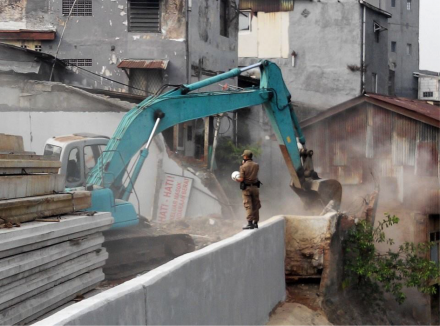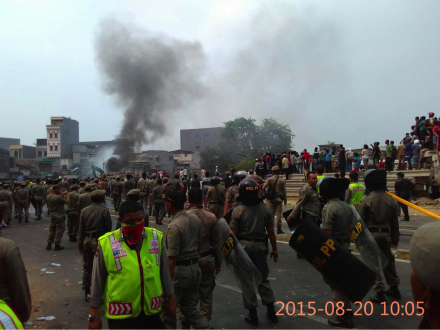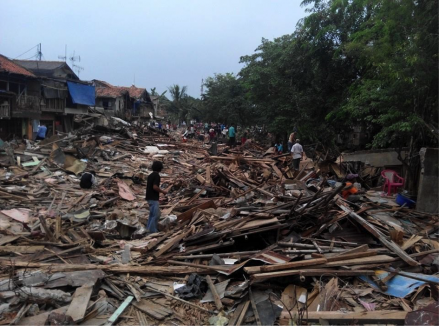People, politics and planning collide in riverside slum Kampung Pulo.
In the middle of the night, my phone beeps.
It’s a text message from Muiz, a 28-year-old inhabitant from the Jakarta riverbank settlement where I have conducted anthropological research for over five years now.
‘It has begun’, writes Muiz, and I instantly realise that he is talking about the evictions of Kampung Pulo.
Only two hours later, my phone beeps again.
This time it’s my colleague Rita Padawangi, a research fellow from the National University of Singapore who has been doing work in the same neighbourhood. ‘Have you heard?’, she writes, ‘evictions have begun.’
Over the next hours, Rita, I and our informants keep in contact about the actions taking place in Jakarta.
The following recounts the lead up to those evictions and what our informants in Kampung Pulo went through on Thursday 20 August.

A bulldozer demolishing buildings, 20 August 2015. Photo: Azas Tigor Nainggolan.
Threatened by floods, threatened by evictions
Kampung Pulo has been threatened with evictions for a long time. It is located alongside the banks of a branch of the Ciliwung River, the largest river in Jakarta and one that regularly floods.
Formally, the government deems Kampung Pulo as an ‘illegal’ neighbourhood. According to Indonesian law, it is forbidden to inhabit riverbanks, as these are supposed to serve as water-catchment areas. Nevertheless, around 3.5 million slum dwellers have settled along the city’s riverbanks, as they are unable to afford housing in other areas of Jakarta.
While private sector development in Jakarta is under-regulated and sees a booming real estate market in hands that exclude the poor, state housing for the poor has become inadequate relative to demand.
As a result, many of Jakarta’s poor have developed large informal settlements along the city’s waterways, rivers, reservoirs and sluices. Their homes are made from wood, asbestos, plastic and stone. This informal settlement contributes to the pollution and clogging of Jakarta’s flood-prone areas.
Recurrent floods are a problem for Jakarta, but they are of particular concern for the city’s poorest inhabitants, who live in the city’s most flood-prone locations. Whenever floods occur, houses are inundated by contaminated river water, damaging people’s valuables and exposing them to water borne diseases.
The floods worsen the economic situation of the poor, which in turn increases their vulnerability to the negative consequences of floods.
But perhaps even more threatening than floods, is the prospect of eviction, which has long been threatened by the government as part of an enormous flood-mitigation project. The plan is to widen and deepen the city’s rivers from 2015 onwards, meaning that 34,000 riverbank settlers will be evicted and forcibly resettled in the near future.
It is likely that most of them will be evicted without adequate compensation, as residents do not possess formal land rights according to the current land registration system. To many, this feels unjust – many families have lived for generations in the kampong and the existence of Kampung Pulo even predates Indonesia’s agrarian law that forms the basis of its land ownership system.
In public announcements, the city governor, Ahok, has insisted that he will provide evictees with ‘luxurious’ rental apartments in a nearby location (Jatinegara Barat Road). However, the 520 units he refers to are inadequate to house all affected residents. Remaining kampong residents would have to be relocated to other public housing units on the outskirts of Jakarta.
Resettlement would damage the livelihoods and social fabric of the kampong; the majority of the Kampung Pulo residents work in a nearby market, and would lose their clientele if they move. Furthermore, forced resettlement would break social networks and mutual support-groups that help residents overcome daily financial struggles.
Over the past few years, the threats of eviction have become ever more concrete. At the same time, residents were given hope by politicians or activists wanting to help them– hope that would eventually prove to be false.
From threats to action
Ciliwung Merdeka is a foundation led by Indonesian activist Sandyawan Sumardi. Since commencing work on the riverbanks after a large flood in 2000, he and a group of volunteers have been involved in offering aid to flood-victims, free medical services and education to slum dwellers, and training among the riverbank inhabitants. More recently, the foundation has focused on the issue of eviction.
With an architect in its team, Ciliwung Merdeka facilitated weekly gatherings in the communities, during which residents were asked for input for a possible design proposal to counter the city’s resettlement plan. The process was assisted by architecture students and a design consultant.
Ciliwung Merdeka also collected documents that the residents owned and that provided some form of evidence that they had built their houses themselves, bought them (and owned proof for this) or had users’ rights because they had been living there for long time. A map of the land status was presented to the governor in July 2015.
Finally, they created an alternative proposal for social housing, which they called Kampung Susun, although at the time the focus was more on Bukit Duri, another old riverbank settlement across the river from Kampung Pulo.
In 2013, during a visit to the neighbourhood, the then governor Joko ‘Jokowi’ Widodo accepted the proposal. However, after Jokowi became president, the new governor (Ahok) announced that he rejected the plan.
However, in July 2015 governor Ahok changed his tone, promising in the local media that Kampung Pulo residents could remain living in their neighbourhoods, only they would have to move to a subsidised apartment yet to be built in the neighbourhood.
He agreed to compensate residents whose land would be affected by the river widening project with another property, which would be built close to their current houses. He proposed that the building of this new complex could start as early as this year.
However, one week after the governor made these promises, Ciliwung Merdeka received the news that Ahok had changed his mind yet again, now convinced that the riverbank settlers occupied the land illegally, and thus they had to be evicted as soon as possible, and they have no right on compensation. On Thursday 20 August the evictions started.
Evictions
In the early morning, hundreds of special police forces and soldiers arrived at the neighbourhood. Behind them stood a line of heavy machines and bulldozers. Residents were warned to leave, as their houses would be demolished.
Our informants wrote to us that many people were crying, shouting: ‘this is my house! This is my family!’ Most were too scared to protest the authorities, but some tried to fight the police. As early as 9am, the police deployed tear gas. Chaos ensued, stones hurled and a backhoe was burned. Informed about the clash, the governor refused to go down to the scene and said from his office. “Go ahead and burn [the backhoe],” he said. “I will send more troops to the ground.”
The government secretary also insisted that the residents had “no legal rights” to stay on the land. Coverage from newspapers repeatedly featured the governor and his aides claiming that the residents were “anarchic”, that these residents had been illegally occupying state land, and that the government had “no choice” but to evict them. Media coverage systematically framed residents as ungrateful citizens who kept defying the government’s effort to provide them “luxurious apartments”.

Clashes between residents and police. Photo: Abdul Muiz, Ciliwung Merdeka.
Little was mentioned about the frustration of residents over the government’s confusing statements, or about the denial of Ciliwung Merdeka’s alternative social-housing proposal. Admittedly, there had been an informative gathering about the relocation, but according to residents, this was more to encourage them to quickly sign up for the rental apartments: to do so they had to sign a statement that they own no property in Jakarta.
Most of the residents, however, have some form of evidence that they have been living in their house for long and feel that they have rights. Moreover, they pay land taxes to the government. Therefore, they were reluctant to declare that they had no land property at all.

Kampung Pulo Ciliwung riverbank after twelve houses are demolished at the end of the day on 20 August 2015. Bulldozers are expected to come back the next day. Photo: Azas Tigor Nainggolan.
As evening fell on that fateful Thursday, most residents who were evicted, or had moved to the rental flat on Jatinegara Barat. As for the others, we don’t know where they have left for or where they will spend the night.
The governor claimed that 146 families had moved into the flats and that as many as 249 families had gotten their keys. Officials say that this is for the improvement of the residents’ living condition. However, we argue that on this day regretfully violence was deployed, doors for dialogue were shut, and polarisation was perpetuated.
According to media, ten residents were hurt from the violent evictions, and 27 were arrested.
What concerns us the most is the polarisation of Jakartans in responding to the news about the eviction.
On social media, we have received comments that Kampung Pulo residents deserved to be evicted because they were illegal. Many comments in Kompas online praised Ahok for being “tough” on “anarchists”.
The governor also perpetuated the stereotype of opportunistic migrant squatters who irresponsibly settle on state land by offering them 5 million rupiah per family from his own pocket, as long as they get out of Jakarta to go back to their “villages”, contradicting the fact that many of the residents were born and raised in Kampung Pulo.
As researchers who have been in the field for years and have engaged with riverbank communities, we are concerned about the fact that Jakarta has now become an even more segregated city in which residents base their opinions on assumptions that are formed through the media rather than on social exchanges.
Furthermore, there is also a tendency to blame these evictees for flooding in Jakarta and that the eviction will alleviate the problem, even though the Ciliwung flood issues has more to do with development-induced environmental degradation.
Roanne van Voorst is a lecturer in Social and Cultural Anthropology at the University of Amsterdam. Rita Padawangi is a senior research fellow in the Asia Research Institute at the National University of Singapore.
 Facebook
Facebook  Twitter
Twitter  Soundcloud
Soundcloud  Youtube
Youtube  Rss
Rss 